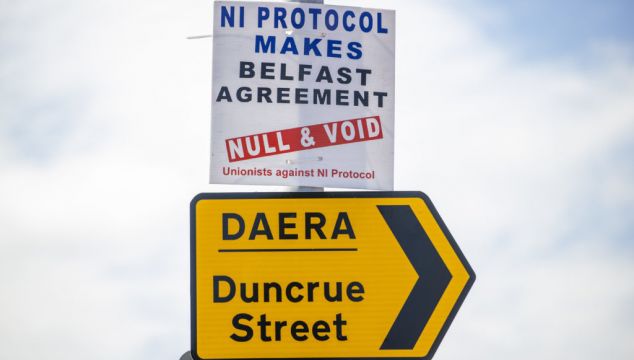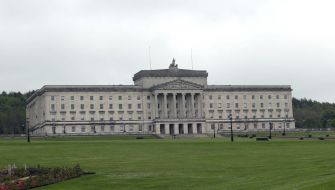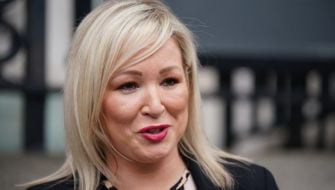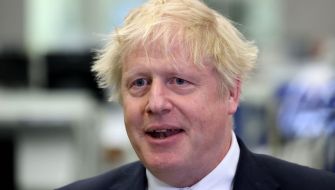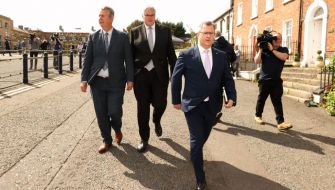The Northern Ireland Protocol, the possibility of a border poll, the cost-of-living crisis and the future of the Stormont powersharing Executive were among the key issues during the Northern Ireland election campaign.
– The Northern Ireland Protocol
DUP leader Sir Jeffrey Donaldson has said repeatedly that the post-Brexit protocol has cast a long shadow over Northern Ireland’s politics and it has been at the heart of debate throughout the campaign.
Sir Jeffrey’s party quit the powersharing Executive earlier this year in protest at the new trading arrangements which unionists see as an Irish Sea border and he has vowed not to re-enter government until his concerns are addressed.
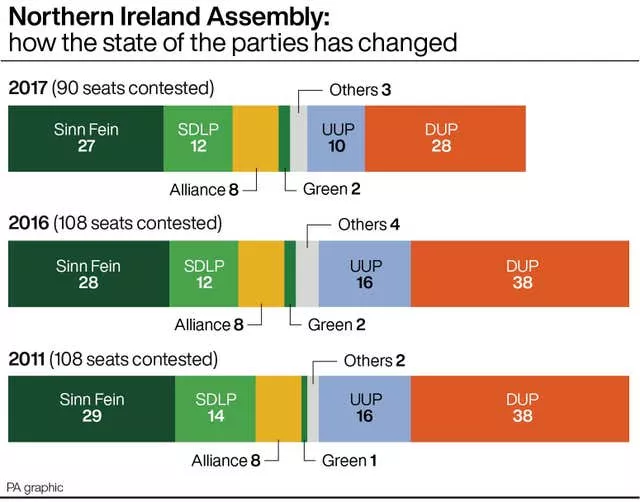
The DUP leader has joined with TUV leader Jim Allister at several rallies in opposition to the protocol. However, Doug Beattie, leader of the Ulster Unionists, which also opposes the protocol, has refused to take part in the rallies, claiming they are increasing tensions in loyalist areas.
Nationalist parties and the cross-community Alliance Party have played down the importance of the protocol as an election issue, stating voters on the doorsteps are more concerned with bread-and-butter issues.
They have said the protocol is a result of Brexit and was introduced to mitigate some of its impacts. They claimed issues with the protocol will be resolved between the UK Government and the EU, and it is not a reason to collapse the Stormont Executive.
– Border poll
The potential of a referendum on Irish unity has emerged as a theme during the election campaign.

However, it has been the unionist DUP which has forced it to the forefront of the agenda, repeatedly claiming that Sinn Féin would use any electoral victory as a mandate to call on the Secretary of State to set a date for a border poll.
Sinn Féin’s vice-president Michelle O’Neill, while acknowledging her party’s desire for a united Ireland, has sought to play down the issue in the short term, instead focusing on issues such as the cost-of-living crisis, the economy and health service waiting lists.
Other parties have accused the DUP of trying to scare people into voting for them by claiming that they are the only party which can stop Sinn Féin from topping the poll.
– The future of the Stormont Executive
Northern Ireland has been without a functioning Executive for several months after DUP First Minister Paul Givan quit his post in protest at the Northern Ireland Protocol.

That position could be set to continue after the election as the DUP has insisted its concerns over Northern Ireland’s place within the UK’s internal market be addressed before they agreed to form an Executive.
Sinn Féin, the SDLP and Alliance Party have all called for an Executive to be formed immediately after the completion of the election.
The Ulster Unionist leader Doug Beattie has said he wants to see a period of intensive negotiation over a programme for government before he agrees to join an Executive.
Both the DUP and UUP have also refused to state if they would nominate for the position of deputy first minister in the event that Sinn Féin won the election and was entitled to nominate for first minister.
– Cost-of-living crisis
All of the main parties have pledged measures to tackle the cost-of-living crisis.

Surging fuel and food prices have impacted most families in Northern Ireland and it has become a prevalent issue during election canvassing.
Sinn Fein, the SDLP, Alliance Party and the UUP have said that Stormont currently has £300 million which could be used on short-term measures to tackle soaring prices, but it cannot be spent because there is no powersharing Executive.
The DUP has disputed this and claims the money can be spent by ministers without an Executive.
All of the parties have called on the Westminster government to do more to alleviate the suffering caused by the cost-of-living crisis.

– Health service
Northern Ireland currently has the longest hospital waiting lists in the UK and emergency departments, GPs and ambulance services have been under intense pressure in recent months.
All of the parties agree that services need to be reformed and are in need of increased funding.
However, several party leaders have raised concern this cannot happen while Northern Ireland is without a functioning Executive.
Earlier this year, Stormont finance minister Conor Murphy attempted to introduce a three-year budget with a priority given to health service funding, but he said the budget could not be progressed after the Executive collapsed.
